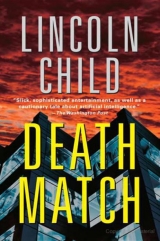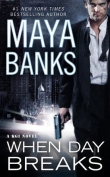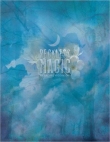
Текст книги "Death Match"
Автор книги: Lincoln Child
Соавторы: Lincoln Child
Жанр:
Триллеры
сообщить о нарушении
Текущая страница: 15 (всего у книги 26 страниц)
“Very good, sir,” said Crandall.
“And I’ll take possession of Dr. Lash, as well.”
“You sure that’s a good idea?” Sheldrake asked.
“Yes, Mr. Sheldrake.”
“Then I release him to your custody.” He turned to Crandall. “Mark that in the duty log.”
Mauchly picked up the satchel, nodded for Lash to stand. “Come on, Dr. Lash,” he said. “This way.” And as they left the room, Lash could hear Sheldrake on the phone, telling the security teams that the alarm was being canceled and they should stand down from Condition Beta.
* * *
Out in the hall, Mauchly closed the unmarked door behind them, then turned. “What were you thinking, Dr. Lash?”
“I guess I wasn’t thinking at all, actually. I’m rather tired. Sorry about that.”
Mauchly looked at Lash a moment longer. Then he nodded slowly. “I’ll have these returned to your office,” he said, indicating the binders. “They’ll be waiting for you Monday morning.”
“Thank you. What did that guard mean by Condition Beta?”
“This building employs four status codes: Alpha, Beta, Delta, and Gamma. Condition Alpha is normal operation. Beta is heightened alert. Delta is in case of evacuation, fire and so forth.”
“And Gamma?”
“Catastrophic emergencies only. Never invoked, of course.”
“Of course.” Lash realized he was babbling. He wished Mauchly a pleasant weekend and turned away.
“Dr. Lash,” Mauchly said quietly.
Lash turned back. Mauchly was holding out his satchel.
“You might want to use Checkpoint I, on the third floor,” he said. “The guards here are liable to be a little, ah, excitable for a while.”
THIRTY-TWO
Assistant district attorney Frank Piston shifted morosely in the wooden chair. He’d have given just about anything, he decided, to get his hands on the sadist who purchased the furniture for the Sullivan County Superior Court. Just ten minutes – even five – in a dark alley would suffice to make his feelings on the matter clear. He’d been in dozens of courtrooms, judges’ chambers, law offices in the five-story building. Each one had the same bony chairs with flat institutional seats, backs sporting little knobs in all the wrong places. Here in the hearing room of the Board of Pardons and Paroles, it was no different.
He glanced at his watch, sighing disconsolately. Six o’clock on the dot. Figured his case would be the last one heard. By rights, it should have been first on the list. After all, it wouldn’t take more than a few minutes to dispose of the matter, send Edmund Wyre back to the slammer to rot another ten years. But no, he’d had to sit through a dozen hearings, each more boring than the last. It was unbelievable, the shit an assistant DA had to go through. Everybody else had gone home an hour ago, but here he was, numb from the ass down. He’d endured four years of law school, spent close to a hundred grand, for this?
There’d been a scary moment – half an hour before, when that serial rapist’s case had come up – when he thought the parole board would adjourn for the day and he’d have to come back again next week for another torture session. But no, they’d decided to hear the last few cases. They’d denied the rapist parole, of course. Just like they’d denied most of the rest. This board was rough. He reminded himself that, if he ever committed a crime, he’d damn well better do it in another county.
Finally, it was time. The drunk driver who’d run over an elderly pedestrian – aggravated manslaughter, twenty years – parole denied. No surprise there. And now Walt Corso, sour-faced old head of the parole board, cleared his throat.
“The Board of Pardons and Paroles will now review the case of Edmund Wyre,” he said, glancing down at a clipboard on the table before him.
There was a general shuffling among the sea of faces on the far side of the board table. All twelve members of the board were on hand, Piston noticed – which was necessary, of course, whenever a murderer’s case came up. Now that the glum-faced relatives of the drunk driver had shuffled out, the room was almost empty. It was just the board, a court officer, a transcriber, some state officials, and himself. Not even a reporter. There was no way in hell Wyre was going free; everybody knew that. Piston didn’t even understand how the guy had come up for parole so early. You didn’t kill six people and then just—
There was movement to his right: a door opening. And then, Edmund Wyre himself appeared, handcuffed, prison guards on either side.
Piston sat up. This was unusual. Had Wyre hired a lawyer? What the hell was he doing here in person?
The board, however, was not surprised. They watched in silence as Wyre was led before the table. Piss-and-vinegar Corso glanced down again at his clipboard, scribbled a notation. “I understand, Mr. Wyre, that you wished to be present at this hearing, but that you’ve waived the services of a lawyer or parole consultant, preferring to represent yourself?”
Wyre nodded. “That’s right, sir,” he said in a deferential tone.
“Very well.” Corso glanced up and down the table. “Who’s the parole officer?”
One of the state officials seated in the rear stood up. “I am, sir.”
“Forster, is it?”
“Yes, sir.”
“Come forward.”
The man named Forster came down the center aisle. Wyre looked over, nodded.
Corso folded his arms on the table and leaned toward the parole officer. “I must say, Forster, we were surprised to learn of this man’s eligibility.”
You’re not the only one, Frank Piston thought.
“Mr. Wyre’s sentences weren’t stacked, sir,” Forster said. “They’re being served concurrently.”
“I’m aware of that.”
Wyre, the killer, cleared his throat. He glanced down at a piece of paper in his hand. “Sir,” he began, “because of my health, I’d planned to ask for a special needs parole—”
This was too much. Wyre looked and sounded the picture of health. Piston stood up quickly, his wooden chair squeaking loudly against the floor.
Corso glanced over, frowning. “You wish to interject, Mister—?”
“Piston. Frank Piston. Assistant district attorney.”
“Ah yes, young Piston. Proceed with your interruption.”
“May I point out, sir, that offenders convicted of aggravated offenses are not eligible for special needs paroles?”
“The board is aware of that, thank you. Mr. Wyre, you may proceed.”
“As I was saying, sir, I hadplanned to ask for a special needs parole. But then I learned it would not be necessary.”
“So the case summary says.” Corso glanced at the parole officer. “Mr. Forster, would you care to explain?”
“Sir, Mr. Wyre has amassed a remarkable amount of good conduct time. The maximum permissible, in fact.”
Piston sat forward. Now, that was bullshit. He’d heard more than once about the kind of trouble Wyre had caused in prison. He was the worst of offenders, a stone killer with the mind of a fox. He was always turning prisoners against each other, inciting fights and riots, sowing dissent with the guards. Not to mention that string of jailhouse murders. You didn’t exactly rack up “good time” for shanking fellow inmates, even if nothing could be proven.
“Said good conduct time, along with Wyre’s community service, participation in work programs and rehabilitation encounter groups, has accelerated his eligible parole date – with mandatory supervision factored in, of course – to September 29 of this year.”
Piston felt a current of shock go through him. Immediately, he stood again. September 29 was two days ago. Wyre’s eligible? Already? Impossible.
Corso glanced over. “You have something further to add, Mr. Piston?”
“No. I mean, yes. Good conduct time is a privilege, not a right. It doesn’t change the fact that Wyre here killed six people, including two police officers.”
“Are you forgetting, Mr. Piston, that Mr. Wyre here was convicted, and sentenced, for the murder of one person?”
Piston swore silently. This was true: Wyre had only been brought to trial for the murder of his final victim. There had been legal technicalities involved, some bungling of the evidence. Though it seemed foolish in hindsight, the DA had wanted to go for the one sure conviction rather than taking a chance on having Wyre walk on circumstantials. There’d been a hue and cry in the press at the time – didn’t these jokers remember that?
Aloud, he said, “I’m not forgetting, sir. I’m only asking that the circumstances of the murders, the nature of Wyre’s atrocities, be factored in—”
“ MisterPiston. Are you telling the parole board how to do its job?”
Piston swallowed. “No, sir.”
Corso shook a sheaf of papers over the desk at him. “Do you have all the facts of this hearing? Are you in possession of this case summary?”
“No, sir.”
“Then sit down and bite your tongue, young man, until you have something of value to add.”
Wyre glanced back at Piston. It was a brief, almost casual look, but it chilled the lawyer to the bone. It was the kind of look a cat gave a canary. Then the convict turned back, smiling once again at the board.
Piston – shaken by the parole eligibility, unnerved by the eye contact with Wyre – tried to calm down, think straight. He had to remember who he was dealing with here. Everybody knew Wyre had killed those two cops. He’d set them up, stalked them, planned on killing an FBI agent as well. Old Corso wasn’t likely to forget that, either, and he was as close to being a hanging judge as any parole chief could be. Anyway, there would be all the details of the case summary to wade through. That’s where Wyre would get nailed, if nowhere else.
Corso seemed to read his mind. “Very well, Mr. Forster, let’s get to this summary of yours. The entire board has had a chance to look at it. I must say we were all a little surprised by your findings, none more than myself.”
“I understand that completely, sir. But I stand by both the evaluation and the pertinent data.”
“Oh, I’m not questioning anything, Mr. Forster. You’ve always proved yourself conscientious in your case work. We’re just… a little surprised, that’s all.” Corso leafed through the summary report. “These social profiles, the psychological batteries, Wyre’s history of institutional adjustment. I’ve never seen such scores.”
“Neither have I, sir,” said Forster.
Standing beside the parole officer, Wyre’s eyes glittered.
“And these testimonials you’ve procured are equally remarkable.”
“They were all in the database, sir.”
“Hmm.” Corso riffled through the final pages of the document, then pushed it aside. “Yet I don’t know whywe are so surprised. After all, we’re here because we believein the efficacy of our prison system – no? We’ve struggled to bring these services, these opportunities for rehabilitation, to our inmates. So why should we be so shocked when we come face to face with an instance where this rehabilitation works? With a success story?”
Oh, my God, Piston thought. There was only one thing that could put Corso in a lenient mood. And that was the dangled carrot of advancement. Because Corso, the parole board head, was also Corso, would-be assemblyman. And transforming Edmund Wyre from sadistic murderer to reformed penitent would be a feather in his cap like no other…
But that couldn’t be, it simply wasn’t possible. Wyre was a puff adder, a malevolent nut case. What was in that case summary? What had happened on the tests?
“Sir,” Wyre said, gazing meekly at Corso, “in light of all this, I would like to request the board now grant my application for parole, set a release date, and formulate a plan for parole supervision.”
Piston stared in growing disbelief as Wyre glanced down again at the sheet of paper in his hand. He’s got this process nailed. Somebody’s coached him, shown him just what documents to read. But who?
Instinctively, he rose once again to his feet. “Mr. Corso!” he cried out.
The old man frowned at him. “What is it now?”
Piston’s mouth worked, but no words came. Wyre glanced casually over his shoulder. His eyes narrowed as he caught Piston’s gaze, and he licked his lips, slowly and deliberately: first the upper, then the lower.
Piston sat down abruptly. As the drone of conversation picked up again at the front of the room, he reached into his pocket, pulled out his cell phone, and dialed the office. It was, as he expected, answered by the service. He began to dial his boss’s private number, then stopped. The DA was out on the links right now, grabbing a quick eighteen, and he would have turned his phone off, as always.
He replaced the phone in his pocket and stared back at the parole board with slow, dreamlike movements. Because this felt like a dream: one of those nightmares where you witnessed something terrible unfolding – something you knew would lead to tragedy, disaster – yet you remained paralyzed somehow, powerless to change anything, doanything…
And that was where the similarity ended. Because, Piston knew, one always woke from nightmare. But from this there would be no awakening.
THIRTY-THREE
Change of plans,” Lash said, leaning forward to speak with the driver. “Just let me off here, please.”
He waited for the taxi to clear Columbus Circle and nose to the curb, then he paid the fare and got out. He watched the cab lose itself in a sea of identical yellow vehicles, then put his hands in his coat pockets and began walking slowly up Central Park West.
He wasn’t sure, exactly, why he’d decided to get out several blocks short of the restaurant. Something about not wanting to bump into her outside. And what exactly did that mean? It had to do with controlling the situation: he wanted to see her first, establish his own space before they met. It had to do with nervousness.
In a different mood, he might have smiled at this piece of self-analysis. But there was no mistaking his rapid breathing, his elevated heart rate. Here he was, Christopher Lash, eminent psychologist and veteran of a hundred crime scenes – nervous as a teenager on his first date.
It had begun slowly, that morning, when – instinctively – he’d picked up the phone to call Tavern on the Green. Eden had already made the reservation, but he wanted to choose the dining room personally. As quickly as he’d picked up the phone, he put it down again. What should it be: the Crystal Room, with its glittering array of chandeliers? Or the woodsy ambiance of the Rafters Room? It had taken him ten minutes to decide, then another fifteen on the phone, name-dropping and cajoling the best possible table out of the reservationist.
This wasn’t like him. He rarely ate out anymore, and when he did he was indifferent to seating. But it was equally unusual to pause beside a bus stop and scrutinize his image in the glass, as he was doing now. Or to worry that the tie he’d chosen was too passé, or too gauche, or maybe a little of both.
No doubt Eden had anticipated such reactions. No doubt, in the normal course of things, he’d have been briefed, given a reassuring pep talk. But this was not the normal course of things. Somehow, the company that never made a mistake had made one. And he was now walking up Central Park West, the time was 8 p.m. precisely, and for the first time in several days his thoughts were not preoccupied with the deaths of the Thorpes and the Wilners.
Ahead, where West Sixty-seventh Street emptied into Central Park, he could see countless white lights twinkling among the trees. He maneuvered his way past the clutter of limousines, then passed through the restaurant’s outer doors. He smoothed his jacket, making sure the small pin Eden had sent was still in place. Even that little detail had been fussed over for several minutes: adjusting its placement on his lapel, making sure it was clearly visible yet not too obvious. His mouth was dry, his palms sweaty. Annoyed, Lash wiped his hands against the back of his trousers and moved with determined strides toward the bar.
It all comes down to this, he thought. Funny – all the time he’d spent undergoing his own evaluation, studying Eden and the two supercouples, he’d never stopped to think about what it must feel like: waiting, wondering how that perfect person would look. Until today. Today, he’d thought of little else. He’d learned, from painful experience, what his perfect woman wasn’tlike. She wasn’t like Shirley, his ex-wife, with her inability to forgive human weakness, accept tragedy. Would his perfect woman be a blend of earlier girlfriends, some composite generated by his subconscious? Would she be an amalgam of the actresses he most admired: the poised limbs of Myrna Loy, the heart-shaped face of Claudette Colbert?
He stopped in the entrance of the bar, looking around. There were groups of twos and threes scattered around the tables, chatting boisterously. Other, single people were seated at the bar…
And there she was. At least, he thought it must be her. Because a small pin identical to his own was fixed to her dress; because she was looking directly at him; because she was rising from her seat and approaching with a smile.
And yet it could not be her. Because this woman looked nothing like what he expected. This was not willowy, slight, brunette Myrna Loy: this woman was tall and raven-haired. Mid-thirties, perhaps, with mischievous hazel eyes. Lash couldn’t remember ever going out with anybody almost a head taller than himself.
“Christopher, right?” she said, shaking his hand. She nodded toward his pin. “I recognize the fashion accessory.”
“Yes,” he replied. “And you’re Diana.”
“Diana Mirren.” Her accent was unexpected, too: a smooth contralto with a distinct Southern lilt.
Lash had always felt a completely unreasonable scorn for the intellect of Southern women; something about the accent set his teeth on edge. He began to wonder if, perhaps, the same mistake that had sent his avatar into the Tank had carried over to the matchmaking process itself.
“Shall we go in?” he said.
Diana slung her purse over her shoulder and together they approached the reservationist.
“Lash and Mirren, eight o’clock,” Lash said.
The woman behind the desk consulted an oversized book. “Ah, yes. In the Terrace Room. This way, please.”
Lash had chosen the Terrace Room because it seemed the most intimate setting, with its hand-carved ceiling and tall windows giving out onto a private garden. A waiter seated them, then filled their water glasses and slipped two menus onto the table before stepping back with a bow.
For a moment, there was silence. Lash glanced at the woman, noticed she was looking back at him. And then, Diana laughed.
“What?” he asked.
She shook her head, reached for her water glass. “I don’t know. You – you’re not what I expected.”
“I’m probably older, and thinner, and paler.”
She laughed again, and flushed slightly.
“Sorry about that,” he added.
“Well, they told us not to have preconceptions. Right?”
Lash, who hadn’t been told anything, simply nodded.
The sommelier approached, silver tastevindangling around his neck. “Something from the wine list, sir?”
Lash glanced at Diana, who nodded enthusiastically. “Go on. I love French wine but know practically nothing about it.”
“Bordeaux okay?”
“Naturelement.”
Lash picked up the list, scanned it. “We’ll have the Pichon– Longueville, please.”
“Pichon-Longueville?” Diana asked as the sommelier walked away. “The Pauillac super-second? Should be fantastic.”
“Super-second?”
“You know. All the qualities of a premier cruwithout the price.”
Lash put the list to one side. “I thought you didn’t know anything about wine.”
Diana took another sip of water. “Well, I don’t know nearly as much as I should.”
“And how’s that?”
“Last year I went with a group on a six-week tour of France. Spent an entire week in the wine country.”
Lash whistled.
“But it’s embarrassing, what I retained and what I didn’t. For example, I remember that Château Beychevelle was the prettiest of the châteaux. But ask me for the best vintages and I’m hopeless.”
“Still, I think maybe you should be the official taster for this table.”
“No objections.” And Diana laughed again.
Normally, Lash disliked people who laughed out loud frequently. Too often it substituted for punctuation, or something that could be better expressed in words. But Diana’s laugh was infectious. Lash found himself smiling as he heard it.
When the sommelier returned with the bottle, Lash directed him to Diana. She peered at the label, swirled the wine, brought the glass to her mouth, all with a great show of mock gravity. Their waiter came by again and recited a long list of the evening’s special dishes. The sommelier filled the glasses and departed. Now Diana raised hers in Lash’s direction.
“What shall we drink to?” Lash asked. She’ll say, “To us.” That’s the way these things always work.
“How about transvestites?” Diana replied in a buttery drawl.
Lash almost dropped his glass. “Huh?”
“You mean, you didn’t look into it?”
“Into what?”
“Into that statue. You know, in the fountain, outside the Eden building. That ancient, ancient figure, surrounded by birds and angels? When I first saw it, it seemed the strangest thing in the world. Couldn’t tell if it was male or female.”
Lash shook his head.
“Well, it’s a good thing one of us did. It’s Tiresias.”
“Who?”
“From Greek mythology. See, Tiresias was this man who got turned into a woman. And then turned back into a man.”
“What? Why?”
“Why? You don’t ask why. This was Thebes. Stuff happens. Anyway, Zeus and Hera were having an argument about who enjoyed sex more: men or women. Since this Tiresias was the only person who’d tried it both ways, they called him in to settle the argument.”
“Go on.”
“Hera didn’t like what Tiresias had to say. So she blinded him.”
“Typical.”
“Zeus felt bad, so he gave Tiresias the gift of prophecy.”
“Big of him. But there’s something you left out.”
“What’s that?”
“What Tiresias said to make Hera so mad.”
“He said women enjoy sex more than men.”
“Really?”
“Really. Nine times more.”
We’ll get back to that later, Lash thought to himself. He lifted his glass. “By all means, let’s drink a toast. But shouldn’t we be drinking to hermaphrodites?”
Diana considered this. “Right you are. To hermaphrodites, then.” And she raised her glass to his.
Lash took a deep sip, found it excellent. He decided he was glad Diana didn’t have the looks of Claudette Colbert. If she had, he’d have been intimidated. “Where did you find this particular nugget of information?” he asked.
“Actually, I knew it already.”
“Let me guess. You read Bulfinch’s Mythologyon your trip across France.”
“Nice try, but wrong. You could say it’s part of my job.”
“Really? And what job is that?”
“I teach English literature at Columbia.”
Lash nodded, impressed. “Great school.”
“I’m still just an instructor, but it’s a position with a tenure track.”
“What’s your specialty?”
“The Romantics, I guess. Lyric poetry.”
Lash felt a strange tremor, as if something deep inside had just slid home. He’d enjoyed Romantic poetry in college, until psychology and the demands of graduate school pushed it to one side. “That’s interesting. As it happens, I’ve been reading Bash – o recently. Not exactly Romantic, of course.”
“In his own way, very much so. The greatest haiku poet of Japan.”
“I don’t know about that. But his poems have stuck in my mind.”
“Haiku’s like that. It’s nefarious. It seems so simple. But then it sneaks up on you from a hundred different directions.”
Lash thought of Lewis Thorpe. He took another sip of wine, then quoted:
Speechless before
these budding green spring leaves
in blazing sunlight
As he spoke, Diana’s smile faded and the look on her face grew intent. “Again, please,” she said quietly.
Lash obliged. When he finished, a silence fell over the table. But it was not an awkward silence. They merely sat, enjoying a moment of contemplation. Lash glanced at the surrounding tables, at the rich evening colors that lay over the park beyond. Without his realizing it, the nervousness he’d felt entering the restaurant had faded away.
“It’s beautiful,” Diana said at last. “I’ve had moments like that.” She paused a moment. “It reminds me of another haiku, written by Kobayashi Issa more than a century later.” And she quoted in turn:
Insects on a bough
floating downriver,
still singing.
Their waiter reappeared. “Have you decided what you’d like this evening?”
“We haven’t even cracked the menu,” Lash said.
“Very good.” The man bowed again and walked away.
Lash turned back to Diana. “The thing is, beautiful as they are, I don’t really understand them.”
“No?”
“Oh, I guess I do on a superficial level. But they’re like riddles, with some deeper meaning that escapes me.”
“That’s the problem right there. I hear it all the time from my students.”
“Enlighten me.”
“You’re thinking of them like epigrams. But haiku aren’t little puzzles that need to be solved. To my mind, they’re just the opposite. They hint at things; they leave a lot to the imagination; they imply more than they say. Don’t search for an answer. Think, instead, of opening doors.”
“Opening doors,” Lash echoed.
“You mentioned Bash – o. Did you know he wrote the most famous haiku of all? ‘One Hundred Frogs.’ It consists of only seventeen sounds – all traditional haiku does. But guess what? It’s been translated into English more than fifty different ways. Each translation utterly different from the rest.”
Lash shook his head. “Amazing.”
Diana’s smile returned. “That’s what I mean about opening doors.”
There was another, briefer silence as an under-waiter crept up and refilled Lash’s glass. “You know, it’s funny,” Lash said as the man left.
“What’s funny?”
“Here we’ve been talking about French wine and Greek mythology and Japanese poetry, and you still haven’t asked what I do.”
“I know I haven’t.”
Once again, he was surprised by her directness. “Well, isn’t that usually the first topic that comes up? On first dates, I mean.”
Diana leaned forward. “Exactly. And that’s what makes this so special.”
Lash hesitated, considering. Then, suddenly, he understood. There was no needto ask the usual questions. Eden had taken care of all that. The tiresome introductory baggage, the blind date checks-and-balances, weren’t important here. Instead, a journey of discovery lay ahead.
This hadn’t occurred to him before. It was a tremendously liberating thought.
The waiter returned, noticed the menus remained untouched, bowed yet again, and turned away.
“Poor guy,” Diana said. “He’s hoping for a second seating.”
“You know what?” Lash replied. “I think this table’s booked for the rest of the evening.”
Smiling, Diana raised her empty hand in imitation of a toast. “In that case, here’s to the rest of the evening.”
Lash nodded. Then he did something unexpected, even to himself: he took Diana’s fingers in his own and raised them gently to his lips. Over the curve of her knuckles, he saw her eyes widen slightly; her smile deepen.
As he released her hand, he became aware of the faintest of scents. It wasn’t soap or perfume, but something of Diana herself: a hint of cinnamon, of copper, of something else that resisted identification. It was subtly intoxicating. Lash thought back to what Mauchly had said in Eden’s genetics lab: about mice and their unusual method for sniffing out the most radically different gene pool for potential mates. Abruptly, he laughed aloud.
Diana said nothing, merely raising her eyebrows in question.
In response, Lash lifted his own hand, filled this time with his wine glass. “And here’s to a universe of diversity,” he said.








